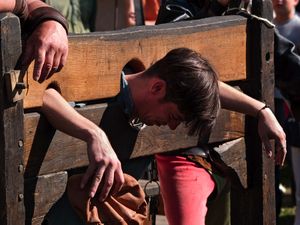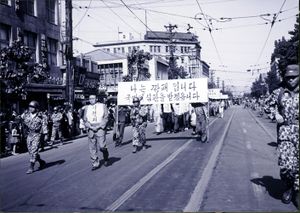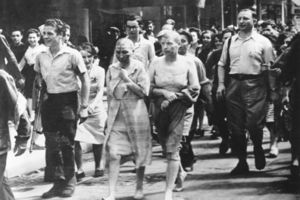Public humiliation: Difference between revisions
(Created page with "{{Header|Public humiliation 03/24}} thumb|South Korean gang leader Lee Jung-jae being shame-paraded by Park Chung Hee's military regime (1961). '''Public humiliation''' or '''public shaming''' is a form of punishment whose main feature is dishonoring or disgracing a person, usually an offender or a prisoner, especially in a public place. It was regularly used as a form of judicially sanctioned punishment in previ...") |
No edit summary |
||
| Line 24: | Line 24: | ||
{{sa-entertainment}} | {{sa-entertainment}} | ||
{{sa-punishments}} | |||
== See also == | == See also == | ||
* [[Humiliation|Erotic humiliation]] | * [[Humiliation|Erotic humiliation]] | ||
| Line 30: | Line 30: | ||
{{Footer}} | {{Footer}} | ||
Latest revision as of 13:03, 26 March 2024
Public humiliation or public shaming is a form of punishment whose main feature is dishonoring or disgracing a person, usually an offender or a prisoner, especially in a public place. It was regularly used as a form of judicially sanctioned punishment in previous centuries, and is still practiced by different means in the modern era.
In the United States, it was a common punishment from the beginning of European colonization of the Americas through the 19th century. It fell out of common use in the 20th century, though it has seen a revival starting in the 1990s.[1] With the rise of the social media, public shaming moved to the digital sphere, exposing and humiliating people daily, sometimes without their knowledge [2]
Shameful exposure

Public humiliation exists in many forms. In general, a criminal sentenced to one of many forms of this punishment could expect themselves be placed (restrained) in a central, public, or open location so that their fellow citizens could easily witness the sentence and, in some cases, participate as a form of "mob justice".[3]
Just like painful forms of corporal punishment, it has parallels in educational and other rather private punishments (but with some audience), in school or domestic disciplinary context, and as a rite of passage. Physical forms include being forced to wear some sign such as "donkey ears" (simulated in paper, as a sign one is—or at least behaved—proverbially stupid), wearing a dunce cap, having to stand, kneel or bend over in a corner, or repeatedly write something on a blackboard ("I will not spread rumors", for example). Here different levels of physical discomfort can be added, such as having to hold heavy objects, or kneeling on an uneven surface. Like physical punishment and harsh hazing, these have become controversial in most modern societies, in many cases leading to legal restrictions and/or (sometimes voluntary) abolishment.
Head shaving can be a humiliating punishment prescribed in law,[4] but also something done as "mob justice"—a stark example of which was the thousands of European women who had their heads shaved in front of cheering crowds in the wake of World War II,[5][6] as punishment for associating with occupying Nazis during the war. Public shaving was applied to (true or alleged) collaborators after the Allied liberated occupied territories from the Sturmabteilung (NAZI Storm Troopers).[5][6]
Further means of public humiliation and degradation consist in forcing people to wear typifying clothes, which can be penitential garb or prison uniforms.[7][8] Forcing arrestees or prisoners to wear restraints (such as handcuffs or shackles) may also increase public humiliation. In countries such as Japan, France, and South Korea,[9] handcuffs on arrested persons are blurred in media broadcasts and hidden wherever possible to prevent feelings of "personal shame" in the accused and to make the public more likely to maintain a presumption of innocence before trial.[10]
Forcing people to go barefoot has been used as a more subtle form of humiliation in past and present cultures. The exposure of bare feet has served as an indicator for imprisonment and slavery throughout ancient and modern history.[11] Even today prisoners officially have to go barefoot in many countries of the world and are also presented in court and in public unshod.[12][13]
References
- ↑ Shame Returns As Punishment, http://articles.chicagotribune.com/2000-04-12/news/0004120235_1_unusual-punishment-humiliation-sentencing
- ↑ Pundak C, Steinhart Y, Goldenberg J. Nonmaleficence in Shaming: The Ethical Dilemma Underlying Participation in Online Public Shaming. J Consum Psychol. 2021; 31: 478–500. https://doi.org/10.1002/jcpy.1227.
- ↑ (2020) The politics of humiliation: a modern history, First, Oxford New York, NY: Oxford University Press, 48,103. ISBN 9780198820314.
- ↑ "Article 87 ... shall be sentenced to flogging, having his head shaven, and one year of exile..." https://web.archive.org/web/20170826193816/http://www.wluml.org/node/3908 Date: 2017-08-26 , Islamic Penal Code of the Islamic Republic of Iran
- ↑ 5.0 5.1 An Ugly Carnival, https://www.theguardian.com/lifeandstyle/2009/jun/05/women-victims-d-day-landings-second-world-war
- ↑ 6.0 6.1 Shorn Women: Gender and Punishment in Liberation France, < ISBN:978-1-85973-584-8 >
- ↑ Public Humiliation, https://encyclopedia.ushmm.org/content/en/article/public-humiliation (Language: en
- ↑ "The Clothes That Make The Inmate", The New York Times, 1 October 2000.
- ↑ "Why the media in Japan, France and South Korea blur the handcuffs on the hands of suspects", ORDO News, 9 April 2022.
- ↑ "South Korean Perp Walks: What's Up With the Blurred Handcuffs?", KOREA EXPOSÉ, 3 November 2017.
- ↑ Cape Town and Surrounds., http://www.westerncape.gov.za/eng/pubs/public_info/P/82884/3/ (Publisher: Government of South Africa)
- ↑ Thai court sentences activist to 10 years in prison for insulting king - CNN.com, http://edition.cnn.com/2013/01/23/world/asia/thailand-activist-prison-sentence/
- ↑ Extradition hearing for arms dealer postponed, http://www.taipeitimes.com/News/world/archives/2008/07/29/2003418810
| Forms of Entertainment topics |
|---|
Games • Literature • Magic • Music • Parades • Performance • Public punishment • Shopping • Sports • Storytelling • Street performance • Theater |
| Types of Punishments | |||
|---|---|---|---|
See also
External links
Chat rooms • What links here • Copyright info • Contact information • Category:Root

